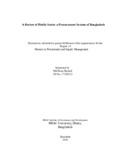| dc.contributor.advisor | Hossain, Shanawez | |
| dc.contributor.author | Rashid, Md Reza | |
| dc.date.accessioned | 2019-03-13T04:16:45Z | |
| dc.date.available | 2019-03-13T04:16:45Z | |
| dc.date.copyright | 2018 | |
| dc.date.issued | 2018-12 | |
| dc.identifier.other | ID 17382012 | |
| dc.identifier.uri | http://hdl.handle.net/10361/11559 | |
| dc.description | This dissertation is submitted in partial fulfillment of the requirements for the degree of Masters in Procurement and Supply Management, 2018. | en_US |
| dc.description | Cataloged from PDF version of dissertation. | |
| dc.description | Includes bibliographical references (pages 49-50). | |
| dc.description.abstract | This study aims to review public sector e-Procurement that is in place in Bangladesh at
present. In order to assess public sector e-Procurement system of Bangladesh this study
also compares public sector electronic procurement of Bangladesh with that of a
developed country and suggests some measures to achieve effective and efficient
e-Procurement system in Bangladesh.
The study is based on both primary and secondary data. Primary data were collected
from discussion with CPTU officials, bidders and a concerned officer from a procuring
entity. Both primary and secondary data were carefully examined and analyzed to find
out current status and challenges of e-Procurement system of Bangladesh. Because of
availability of information Australia was selected for the comparison.
Findings of the study show that most of the government organizations have been
registered to e-GP system because of various effort of CPTU. Even Upazilla Parishads
and municipalities have embraced electronic procurement. There was a boost in
registration to e-GP in the Financial Year 2017-18. It is because CPTU targeted to end
registration for procuring entities.
CPTU arranges training for procuring entities, bidders, banks, project directors and
accounts officers. In the previous financial year more than eight thousand officials
participated in e-GP training. This capacity building initiative boosted implementation
of e-GP. This is further observed that due to e-GP competition and responsiveness on an
average per tender almost tripled in 2017-18 than the past.
Bangladesh is well advanced among south Asian countries with respect to
implementing e-GP. Even Australia, one of the developed countries in the world has
introduced electronic procurement for goods and services only in contrast to procuring
goods, works and services electronically in Bangladesh. Around 30 percent
government purchase in Australia is processed through electronic procurement. In
contrast to Bangladesh, e-Procurement in Australia is decentralized. Both the countries
want to ensure better value for money, more openness and competition.
e-GP in Bangladesh is not free from limitations. Tenders having value more than 500
million BDT, international tenders and tenders for intellectual services cannot be
processed through e-GP. Besides this, CPTU is largely dependent on outsourced IT
consultants for maintaining its e-GP infrastructure. It is important for CPTU to
overcome these challenges so that electronic government procurement can be
implemented in Bangladesh completely. | en_US |
| dc.description.statementofresponsibility | Md Reza Rashid | |
| dc.format.extent | 50 pages | |
| dc.language.iso | en | en_US |
| dc.publisher | BRAC University | en_US |
| dc.rights | BRAC University dissertations are protected by copyright. They may be viewed from this source for any purpose, but reproduction or distribution in any format is prohibited without written permission. | |
| dc.subject | E-procurement | en_US |
| dc.subject | Public sector | en_US |
| dc.subject | Procurement cycle | en_US |
| dc.subject.lcsh | Government purchasing -- Bangladesh. | |
| dc.subject.lcsh | Government purchasing -- Case studies. | |
| dc.title | A review of public sector e-Procurement system of Bangladesh | en_US |
| dc.type | Dissertation | en_US |
| dc.contributor.department | BRAC Institute of Governance and Development, BRAC University | |
| dc.description.degree | M. Procurement and Supply Management | |

